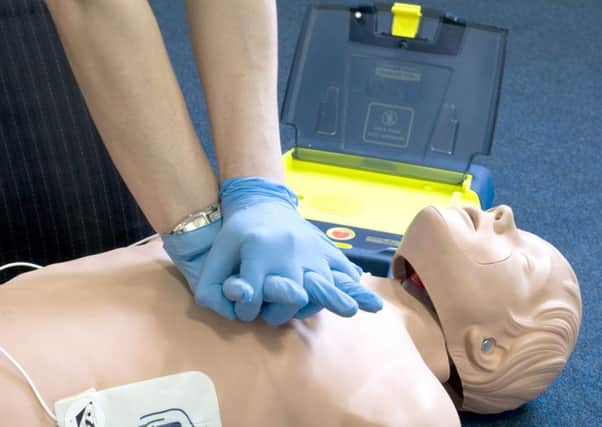Lizzy Buchan: Survival should be the norm, not the exception


What followed felt like an eternity of sleepless nights for his family and panicked messages to friends, as he teetered on the brink of darkness.
Miraculously, he woke from sedation and doctors discovered he had not suffered any brain damage.
Advertisement
Hide AdAdvertisement
Hide AdHe will now go on to live a normal life, albeit with a mini defibrillator implanted in his chest to monitor for irregular heartbeats.
The only reason he is still alive is because, in that awful moment, when he slumped to the ground, his brilliant colleagues gave him CPR to keep oxygen flowing around his body.
Paramedics arrived within minutes and used a defibrillator to re-start his heart, before taking him to hospital. This is a perfect example of the “chain of survival” in action, when the links join together with a dazzling synchronicity to save someone’s life.
My friend is one of the lucky ones.
In Scotland, only one in 20 people survives to be discharged from hospital after a cardiac arrest, where the heart suddenly stops beating and the person loses consciousness.
It should not be confused with a heart attack, where the blood supply is interrupted to part of the heart. This can cause permanent damage but the person remains conscious and still breathing.
I write about all sorts of sad things but there is something about the shock, the raw pain, the sheer pointlessness of it all that makes me want to weep. In that moment, a life is measured in seconds, as the chance of survival drops by 10 to 20 per cent for every minute that passes without CPR or defibrillation.
The cruel condition does not discriminate, as the tragic death of 13-year-old footballer Kieron McDade in North Lanarkshire last week illustrates.
So too does the awful death of Edinburgh teenager Jamie Skinner, who suffered a fatal cardiac arrest in December 2013 while making his debut for Tynecastle FC.
Advertisement
Hide AdAdvertisement
Hide AdLots of good work has been done by charities like the Jamie Skinner Foundation to improve defibrillator provision but there is still so much that needs to be done to reduce the grim toll of deaths. For starters, CPR should be taught in all schools from a young age.
I have watched a four-year-old boy learn the basics and while he might be too young to understand when he needs to do it, it will seem normal to him when he grows up.
We also need better education around defibrillators as there are so many strange assumptions floating around.
The devices are not dangerous as they only deliver a shock when someone’s heart has stopped beating. They are also profoundly easy to use.
Scotland holds many dubious honours in health terms but efforts to improve our response to cardiac arrest are something to be proud of. The University of Edinburgh is doing world-leading research and the Scottish Government launched a forward-thinking cardiac arrest strategy last year, which aims to save an additional 1,000 lives by 2020.
The rest of us have to step up, to be the person in the crowd who leaps into action in an emergency or raises money for an office defibrillator.
My friend’s survival should be the norm, rather than the exception.
• If you would like information about CPR training go to Save a Life for Scotland